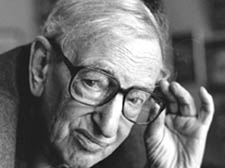|
|
 |
| |

Eric Hobsbawm |
Camden feature | Interview with Marxist historian Eric Hobsbawm | 21st century politics and Capitalism
Veteran Marxist Eric Hobsbawm tells Dan Carrier how he sees the political challenges of the 21st century and predicts ‘a crisis of western capitalism’
IF the past informs us about the future, Marxist historian Eric Hobsbawm can provide a fascinating glimpse of what might be in store for us.
Hobsbawm’s latest work, Globalisation, Democracy and Terrorism, offers his vision of the imminent crisis. Britain should brace itself for an economic downturn that will be the worst since the 1930s, he states.
Hobsbawm, who lives in Hampstead, believes that because Britain has followed the American economic model closer than any other country – the “unregulated globalised free market” – we have to face up to the fact we will bear the brunt of any economic downturn experienced in America.
“We have even liquidated our manufacturing industries to a far greater extent than Germany, France or Switzerland,” he said. “It will be a crisis of western capitalism, but not a global one.”
However, he does not envisage dole queues and soup kitchens.
“The spectre of 1930s-style mass unemployment will probably not raise its ugly head. Jobs will go – especially in the bloated financial sectors in the vulnerable capitalist states such as the USA and Britain, but deindustrialisation has gone so far that even a sudden slump can no longer produce the mass unemployment seen in the 1930s.”
Discussing the challenges facing socialism in the 21st century, he argues that the new century needs a new version of socialism – one that focuses on such issues as ensuring capitalism does not continue to drain the planet’s finite natural resources.
“Twenty-first century socialism,” he says, “will be an economy combining the public and private, non-market and market elements, but one whose object is not maximising economic growth and profit but the survival of the planet and the reconstruction of of a human society battered and increasingly disintegrating under the impact of the past half-century of capitalist development. How this is to be achieved is the big question for this century’s socialists.”
On Saturday the 92-year-old Hobsbawm is leading a discussion with biographer Dai Smith that considers the life and times of Raymond Williams – a man Hobsbawm describes as one of his own heroes.
Williams grew up in a small Welsh village in the grip of the Depression and rose to become one of the most influential left-wing academics of the 20th century.
“From the 1950s onwards his works had great bearing and he is still important today,” says Hobsbawm. “His books are all in print and that is almost unique for a writer of his type.”
Hobsbawm states that Williams’s influence stretched beyond campus-based left-wing cliques.
“He influenced students and intellectuals,” he says. “They read him avidly and he was incredibly approachable and easy to understand. He was read widely by people like himself, who had come from working-class backgrounds.”
Hobsbawm considers the bitter disappointment Williams would have felt watching recent political events unfold. With the New Labour project close to collapse and no electable left-wing hero appearing on a white charger to save the Labour Party in the wake of the devastating results in last week’s elections, “he would hold his head in his hands,” says Hobsbawm.
He added that Ken Livingstone’s mayoral defeat gave a taste of how badly the Labour project was going at the moment: “It is a big blow, not just in political terms. It will weaken the Labour Party in London and the aspirations of the left in general.”
|

|
 |
|
 |
|

